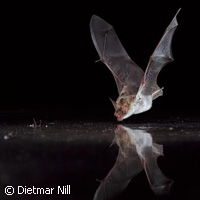How echolocation makes bats mistake mirrors for water�
Bats believe that all smooth surfaces are water because of their reliance on their ears above all other sensory systems, new research shows. Scientists from the Max Planck Institute for Ornithology in Germany found that 15 species of bats all tried to drink from smooth plates because of the way these surfaces reflect the echolocation calls of these flying mammals; they ignored contradictory information from other sensory systems like vision, olfaction and touch. The study was recently presented in the journal Nature Communications. Water is nature's only extended, smooth surface, and bats reliably accept that the sounds produced from these surfaces via their echolocation (the use of ultra-high frequency sounds for navigation) calls prove a drink is nearby. Professor Stefan Greif and Dr Björn Siemers at the Max Planck Institute for Ornithology established that bats can be tricked into believing that all smooth surfaces are water by simulating water surfaces in a large flight room and offering the bats a smooth and a structured plate made from metal, wood or plastic. The researchers found that in weak red illumination the bats fell for the trick and tried to drink from the smooth plate. 'The Schreiber's bat for example tried to drink up to a 100 times in 10 minutes from the smooth plate,' Professor Greif pointed out. Moreover, three different species, namely the greater mouse-eared bat, the Daubenton's bat and the greater horseshoe bat, showed the same results on all three materials. Only from the wooden plates did some bats try to drink a bit less. To determine how widespread this behaviour was, the scientists tested 11 additional species and concluded that at least with insect-eating bats, this behaviour is common. The researchers admitted that they were astonished the animals did not learn that these artificial, acoustic mirrors were not water surfaces. They even observed bats that accidentally landed on the smooth plate, took off again and after a few rounds of flying resumed their drinking attempts. Likewise, even when the scientists placed the plate on a garden table, the bats flew partly underneath the table and then tried to drink. Professor Greif and Dr Siemers concluded that the association of a smooth, horizontal surface with water was hardwired in a bat's brain, and that they largely ignore information from other senses. They repeated their experiment in darkness, thereby eliminating the input of vision. The result? The number of drinking attempts increased from 100 to 160 in 10 minutes. 'So it seems like the bats integrate and weigh up their sensory information, but echolocation dominates all the others,' Professor Greif explained. To determine whether the acoustic information regarding water is fixed in the animals' genes, the researchers repeated the experiment with juveniles that had never before seen a lake or a river. Flightless juveniles were captured in a cave with their mothers and were raised until they were able to fly. However, these young bats likewise tried to drink on first contact in their life with a smooth surface, suggesting that this behaviour is not learned but innate. They now plan to investigate whether bats would behave similarly in the wild, asking if bats so persistently take horizontal mirrors for water, would they also try to drink from artificial surfaces such as skylights, car roofs or winter gardens until they were exhausted. 'We think that bats in nature have other possibilities,' Professor Greif speculated. 'They show high site fidelity and probably have their established water surfaces,' suggesting that 'maybe they try new surfaces, but eventually they will move on.' But he agreed that future studies were needed to evaluate the occurrence, extent and potential ecological consequences of such a scenario.
Countries
Germany



